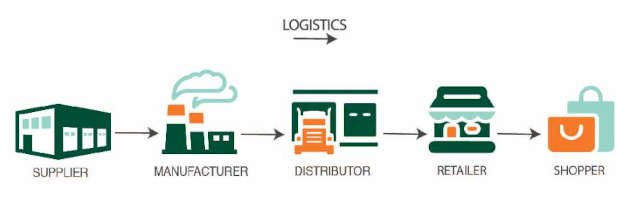Contents
- Make Your Logistics Career Stronger with a Supply Chain Management Program
- What is supply chain management?
- What is logistics?
- What is the difference between logistics and supply chain management?
- Why should you get a degree in SCM rather than in logistics alone?
- Key logistics activities:
- Are logistics jobs in demand?
- Will logistics be automated?
- How do you begin a career in Supply Chain Management?
- Top logistics and supply chain careers
Make Your Logistics Career Stronger with a Supply Chain Management Program
Let’s start with the premise that logistics is different from supply chain management. Many people, regardless of their educational background or expertise, use the terms logistics and supply chain management (SCM) interchangeably. Could they be wrong? Well, yes. In short, logistics pertains to only one part of the supply chain, so it is not to be confused with SCM as a whole.
For many years universities focused on logistics education, but as businesses change to meet the needs of the market, technological advances and globalization, universities are shifting to comprehensive programs like supply chain management.
After teaching logistics courses for some time, I have found an easy way to explain how it — logistics and the supply chain — all works concerning the supply chain.
Here, I provide answers to some of the most frequently asked questions I hear from students and other colleagues about logistics and the supply chain. I will also talk about the advantages of choosing a versatile career in SCM instead of having a singular focus — as you would in logistics.

What is supply chain management?
SCM involves the entire chain of activities that, in the end, deliver products and/or services to a customer. Specifically, supply chain management entails the efficient and effective administration of a network consisting of procurement, production and transportation activities that link suppliers, manufacturers, retailers and customers in providing goods and services.
What is logistics?
Three types of flows occur in the supply chain: products, information and cash. Logistics plays a specific role in the product forward flow and backward flow — the physical distribution or the physical movement of goods. Further, logistics, also known as distribution, is responsible for the materials-handling, order-placing, warehousing-management, carrier selection, product or service delivery, and product and service recovery.

What is the difference between logistics and supply chain management?
Let’s make sure we get this right. Think about SCM in terms of the human body. All of its parts work together to sustain life by performing vital and executive functions. Now think of logistics as the circulatory and nervous systems. All parts and processes in the chain (the body) are important, but some are essential.
A human being could function effectively without an arm or a leg but not without the brain and the heart. If logistics acts like the nervous and circulatory systems, we know that it is responsible for the essential physical flows (circulation of blood) and information flows (brain communication controls).
Why should you get a degree in SCM rather than in logistics alone?
While logistics encompasses many vital activities in the supply chain, there are many other tasks it does not include. A degree in supply chain management gives you the tools and the versatility to flow through all the supply chain activities, related or unrelated to logistics. But, if you choose to concentrate on logistics, a degree in SCM will complement your logistics knowledge, ultimately making you a better, more informed professional.
Key logistics activities:
- Customer Service : Ensuring each customer’s needs are met.
- Demand Forecasting : Projecting product demand.
- Facility Location Decisions : Finding the perfect place to conduct business.
- International Logistics : Conducting logistics activities across international boundaries.
- Inventory Management : Directing activities that happen when customers make orders.
- Materials Handling : Managing short-distance movement of products.
- Order Management : Directing activities that happen when customers make orders.
- Packaging : Supervising marketing (customer) packaging and logistical (industrial) packaging.
- Procurement : Getting the raw materials.
- Reverse Logistics : Supervising the return of products.
- Transportation Management : Managing the physical movement of goods or people
- Warehousing Management : Administering storage places.
Are logistics jobs in demand?
Nearly every industry needs logisticians. The U.S. Bureau of Labor Statistics predicts that employment in this field is projected to grow 5% over the next 10 years, with a median salary of $75k.
Will logistics be automated?
Artificial intelligence and machine learning could present solutions to optimize some logistics activities. However, this does not mean that logisticians will lose their jobs but that the profession itself is likely to change with technology. So, I want to quote one of my colleagues, Dr. Metin Cakanyildrim, whose research could give us an insight into the present and future of automation in the supply chain:

Supply chain operations within warehouses have been automated by using various technologies — such as conveyors, bar codes, optic readers, radio-frequency tags and magnetic readers. While conveyors carry items, codes, tags and readers are used to locate and identify them. In the last several years, warehouse operations are further automated with the deployment of bin-carrying robots and autonomous forklifts. These trends will soon exhibit themselves in inbound supply chain shipments, where driverless trucks will take over the roads. At the retailing end, we expect a larger penetration of cellular device- based purchase transactions. On the other hand, transactions among supply chain partners will be facilitated by blockchains.
Dr. Metin Cakanyildirim, Operations Management Professor,
Naveen Jindal School of Management
How do you begin a career in Supply Chain Management?
If you have not completed an undergraduate degree yet, you can start by enrolling in a Bachelor of Science program in SCM. If you have already completed a bachelor’’s degree, you could start by taking a certificate course or enrolling in a graduate program.
SCM is a STEM-designated program at UT Dallas, which means that students choosing to pursue this career have more scholarship opportunities and other benefits.
Supply Chain Management programs at UT Dallas
- Bachelor of Science in Supply Chain Management
- Master of Science in Supply Chain Management
- MBA in Supply Chain Management
- Executive MBA with an emphasis in Product Lifecycle and Supply Chain Management
- PhD in Management Science, Operations Management Concentration
Which are the best logistics or supply chain management certifications at UT Dallas?
- Lean Six Sigma
- Sourcing Management
- Professional Certificate in Supply Chain Management
- APICS CPIM and CLTD Certification Training/ Prep Courses
Top logistics and supply chain careers
- Logistician
- Fulfillment and Execution Specialist
- Logistics and Distribution Operations Manager
- Fulfillment and Execution Specialist
- Operations Planner
- Supply Chain Analyst
- Strategic Sourcing Coordinator
All in all, I see an exciting future in supply chain management! Please leave a comment below if you have any more questions, or visit our program pages for more information





